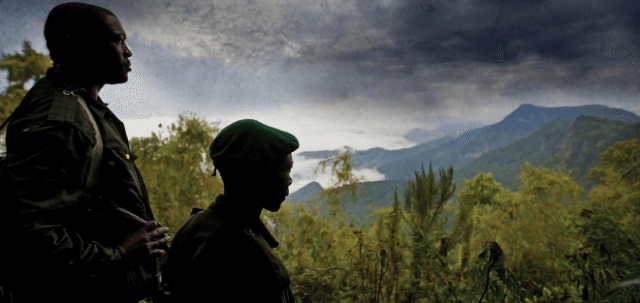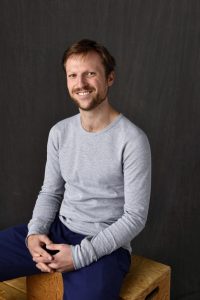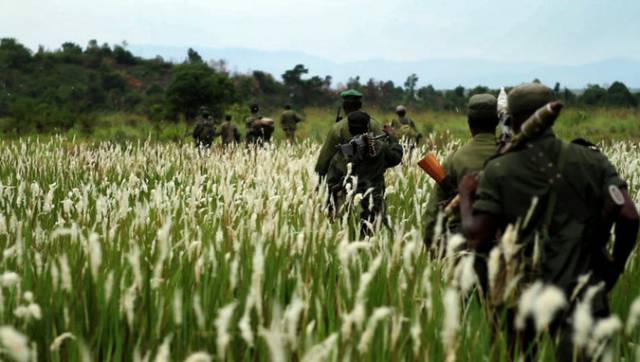
 In Virunga, director Orlando von Einsiedel takes us to one of the world’s most beautiful regions, which has sadly become the center of a neverending battle between greedy oil drillers and conservationists. Virunga National Park is home to the world’s last mountain gorillas, and despite its status as a World Heritage Site it has gained the attention of British oil corporation SOCO, which by default has invited corruption and violence as an assortment of characters threaten the park’s very existence. Despite this being his first feature film, Einsiedel has crafted a suspenseful message film, in which he lets his journalistic abilities shine along with his astute genre knowledge.
In Virunga, director Orlando von Einsiedel takes us to one of the world’s most beautiful regions, which has sadly become the center of a neverending battle between greedy oil drillers and conservationists. Virunga National Park is home to the world’s last mountain gorillas, and despite its status as a World Heritage Site it has gained the attention of British oil corporation SOCO, which by default has invited corruption and violence as an assortment of characters threaten the park’s very existence. Despite this being his first feature film, Einsiedel has crafted a suspenseful message film, in which he lets his journalistic abilities shine along with his astute genre knowledge.
We had the opportunity to talk to the director who discussed the film’s structure, the challenges of shooting in the jungle and how important it is for people all over the world to take action.
Virunga is a spy movie, an action thriller, and a war film. Can you talk about why it was important for you to bring genre elements to this project?
I guess the first thing is when I was gathering the material, there were three types of things I was gathering: investigative, journalistic material, nature documentary footage and more traditional cinéma vérité, observational material, so it was definitely really challenging to take all that and build them into a coherent narrative. The one thing I knew right from the beginning was that I wanted to make a documentary that didn’t feel like a documentary. Funny enough, one of the first cuts had absolutely no talking heads at all, because I wanted to try and push it to the limit of what we could get away with. That one didn’t quite work though, it lacked a bit of engagement and we still needed to have some talking heads just so that you could identify the characters. To the effects of making it feel like a drama, I brought along a drama editor, Masahiro Hirakubo, who’d done Danny Boyle’s Trainspotting, A Life Less Ordinary and some other films, so he helped create the structure. We realized early on that this film could be used as a tool to protect the park and we didn’t want to preach to the choir with a documentary that only a few conservationists would watch, we wanted to make a film that everyone would watch, not only because the issue was important but because it’s an entertaining film. I’m a big believer that documentaries need to be entertaining.
Did anyone try to convince you to make something more traditional?
Yes, there’s always opposing forces and people who were involved early on wanted us to make an investigation film, something for television, and then to make a separate film about protecting the gorillas and I’d always been quite adamant that the investigation was the key in why we were making this film, to show people what SOCO International was doing in the park. It was fundamental to make this work within the context.

Since you were shooting in an environment completely out of your control, were there any times during the shoot where you made the decision to keep rolling even if there were terrible things going on all around you?
Good question, you know, at the beginning I set out to make a very different film, a positive film about the situation in Eastern Congo, because the movies that tend to come out of there are about war and sexual violence, and those are really important stories, but there’s other narratives as well and I wanted to tell a positive story. I came across the story of the park, these really amazing projects that were being developed to bring peace and stability to the region and these amazing rangers risking their life to protect the gorillas. I was only on the ground for about three weeks when this war started and I learned about the oil company and what they were doing, so the film I set out to make took a U-turn and you’re right, as a documentary filmmaker you need to be very flexible. We had to keep the story going.
I bet you have hundreds of hours of footage too…
I thought editing would be easy and it was so difficult (laughs) and we’d filmed much more than those four characters in the film, because there was a number of very brave local people who’d already been investigating SOCO, so we gave them cameras to continue their work and I started following those characters too and there were other rangers as well. But we picked the four characters you saw because they were the most compelling in telling a wider story, each one of their stories told a bigger story.
All this characters and elements that you juggled with made me think of a Robert Altman film, what were some films that you had in mind when you were doing Virunga?
It’s funny, but I looked more to dramas than documentaries for inspiration. The obvious documentary to go to was The Cove, because it plays out like an action movie, there’s also a film called Iraq in Fragments which I always look up to...and it sounds incredible to say but Avatar was a really big influence, this David and Goliath story is the same thing going on in the park, where there’s people trying to protect their homes against outside forces, in the case of Avatar a mining corporation, in our case an oiling corporation. Of course also The Constant Gardener.
The film kicks off with a short historical account of Congo and it really has no “ending” so to speak, and it’s as if this part of the world keeps attracting tragedy for some reason. Did this draw you to the story as well?
At the beginning I realized the film we were making was a microcosm of a larger cycle of violence that has been going on in Eastern Congo for 130 years, and that cycle in a nutshell is outside forces coming to take away Congo’s resources, the results always being bad for the Congolese. There’s a famous saying in Congo: this is the richest country with the poorest people. What we found in Virunga was this process playing out in a micro level, and that’s why I had to include the historical sequence.
This is your first feature, so in terms of logistics, it’s a pretty ambitious undertaking…
At first it was me alone with a Canon 7D camera, and then after a year I brought an assistant with me, and it was just us as a crew working with the rangers, towards the end we brought another cinematographer to help us get some better footage of the animals and wide landscapes. Now about the undercover cameras, I’ve done a lot of investigations which use undercover filming, so I know how to use them quite well, and that was the one thing I could contribute to the investigation that was already going on, giving people the technology to record all these instances of illegality.
Do you feel like becoming a filmmaker was a natural progression after being a journalist?
Absolutely, I did investigations for a long time and I moved away from them over the last few years and started concentrating more on human stories, so this movie brought together my investigative stuff together with my human interest stories.
 What would you say surprised you the most about this story once you were shooting it?
What would you say surprised you the most about this story once you were shooting it?
Two things, first just how incredible and brave the rangers are. These are the people with the greatest integrity and honor I’ve met anywhere in the planet and the real special thing about them is they will die to protect their beliefs. 140 of them have died in the past 30 years protecting the park and they wake up every day knowing this day could be their last, so it’s very humbling to meet people who are willing to die for a bigger purpose. The second thing I took away is how utterly despicable SOCO International’s actions are. This is one of Britain’s richest companies and they’re threatening the park which has the last gorillas and one of Eastern Congo’s last chances at peace, and secondly, this park is a world heritage site, this is the place where humanity started. So if a place as special and iconic as Virunga falls in the face of business, what is left on our planet that is safe from human greed?
I guess the advantage of your documentary is that since it’s on Netflix you’re sitting in people’s homes and can ask them to take a call to action immediately after they watch it. Is being in all these people’s homes at once intimidating in any way?
This is a film with a message, so the partnership with Netflix was fantastic! This was always about using the film as a tool to show the injustice of what’s happening in Eastern Congo and Netflix’s reach is unprecedented, the film will go live in 50 countries where people can watch it whenever they want, share that link...which for us is incredible. Also Netflix really understood that this is more than just a film and they have helped us show the film to influential people all over the world and that relationship will continue. It’s an honor to share the story of the rangers to people and I really hope the world gets behind this park, the only way this park can survive is if the entire world says “not in my name will this park fall so that businessmen can get rich!”
Virunga is now available on Netflix instant.